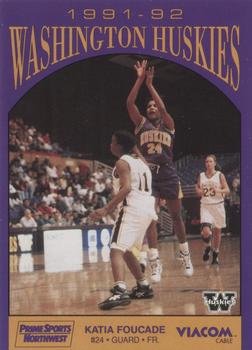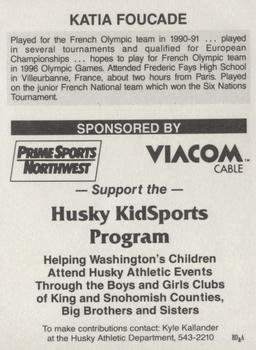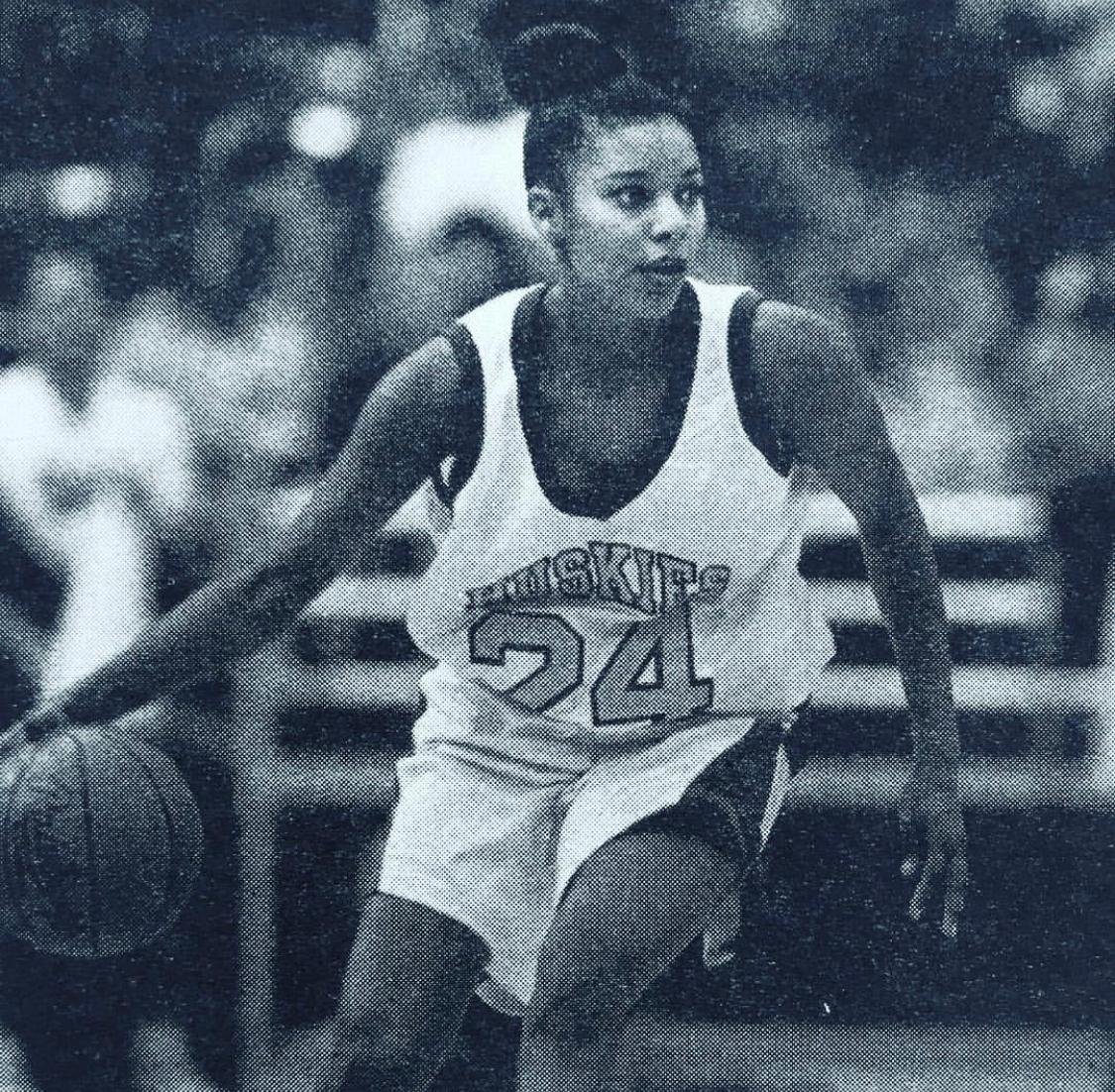🏀0️⃣0️⃣8️⃣ Katia Foucade-Hoard
Photo courtesy of the Musée du Basket.
Meet Katia Foucade-Hoard, the 1993 European Vice-Champion and first French woman to play four years of NCAA D1 basketball on scholarship.
Born May 9, 1971, to parents who migrated from Martinique, the Parisian native grew up playing basketball. As a 12 year-old she debuted with the storied Paris Université Club, where she played for Coach Colette Bonnevie. A few years later, Foucade was recruited to the country’s elite sports school, INSEP (1986-87), then continued with the basketball sport-study section (now known as pôle espoirs) at Lycée Henri-Martin at St. Quentin (1987-88) before playing two seasons with AS Villeurbanne and finishing school. At a high school tournament held in Seattle, Foucade caught the attention of the University of Washington head coach Chris Gobrecht, who subsequently recruited her and offered a scholarship. That’s how, in Fall 1991, Foucade arrived in the Emerald City to live her American dream.
Katia’s Story
As a kid, when she wasn’t training with PUC, Foucade gravitated to Paris’ new outdoor basketball courts, built within playgrounds to enable the informal, free-flowing street-style game popularized in the 1980s and 1990s. “I played on the playgrounds, and that’s where I had fun,” she said. “That’s where I dreamed of going to the United States.”
During these playground basketball sessions, Foucade and her friends—boys as well as girls—tried to imitate the U.S.-style of play that they watched on Canal+ television broadcasts of NBA games. Those courts, with their game, fashion, lingo, and codes, nourished the young point guard’s dream, although she never imagined that one day she would make it a reality on the West Coast.



In Seattle, Foucade quickly found her stride. “It’s very difficult to go to another country without knowing how to speak the local language,” she recalled of her then-limited English. “I had great teammates who helped me, and who laughed with me while making fun of my accent,” she said. “They were very kind, so I never felt laughed at.”
Being French was a magical thing on campus. People were happy to learn where Foucade was from and gushed about how much they liked her hometown. Yet, “it was always surprising to them that I could be French,” she noted. Thus, Foucade engaged in conversations in which she explained how she was French, a basketball player, and Black. Such people-to-people cultural exchanges, what today we call informal sports diplomacy, cracked open American ideas about French identity and culture.
“It was very intriguing to a lot of people,” Foucade recalled of those exchanges.
“A lot of times I had conversations talking about our history, talking about colonization, and how that connected to French culture. Martinique, it’s the Caribbean, but we are still French.”
But No. 24 also left her mark on the hardcourt. The three-time University of Washington Huskies co-captain led her team in assists for three back-to-back seasons (1992-93, 1993-94, 1994-95). She also is inscribed in the record book: as of the start of the 2021-22 season, Foucade remains tied for all-time leading assists in an individual game (13 against SW Missouri State in 1995), and is still one of the Huskies’ top all-time career leaders in assists.
The Sports Diplomacy Connection
Katia Foucade playing for Les Bleues. Photo courtesy of the Musée du Basket.
Although Foucade engaged in informal sports diplomacy at the University of Washington, she was also a formal sports diplomat as a member of Les Bleues. “I’m always so proud to be French everywhere I go,” she said.
Foucade first suited up en bleu with the senior team on May 6, 1991, and juggled national team service throughout most of her college years. At the June 1993 EuroBasket tournament, France fought their way to a silver medal, its first podium finish since 1970. The following year, Les Bleues returned to FIBA World Cup competition after failing to qualify since their seventh-place 1979 result.
As a formal sports ambassador, Foucade and her teammates represented, communicated, and negotiated international public attitudes about France, who is French, and who played basketball. But she also brought a little bit of her American hardcourt lessons to the team.
“The thing I learned in the States is that anyone is as good as anyone else, even if on paper it shows that the other team is better. It doesn’t matter when the ball goes up in the air. It’s only at the end of the game that we’ll see who’s the best.”
Mapping the Connection
From Paris, France to Seattle, Washington
Further Reading
[F] “Le Sport Contre le Racisme,” U.S. Embassy France, September 9, 2020.
[E] Centre for International Studies & Diplomacy, SOAS University of London, “Global Sport Conversations: Activist Athletes with Katia Foucade-Hoard,” SOAS Radio, Fall 2020.
[F] Laurent Rullier, “Le match rétro de la semaine – Eurobasket Féminin Finale 1993 – France/Espagne,” BasketRetro.
[E] Lindsay Sarah Krasnoff, Basketball Empire: A Hidden Story of the (W)NBA’s Globalization (in process).
How to Cite This Entry
Krasnoff, Lindsay Sarah. “Voices: Katia Foucade-Hoard,” FranceAndUS, https://www.franceussports.com/voices/008-katia-foucade-hoard. (date of consultation).



